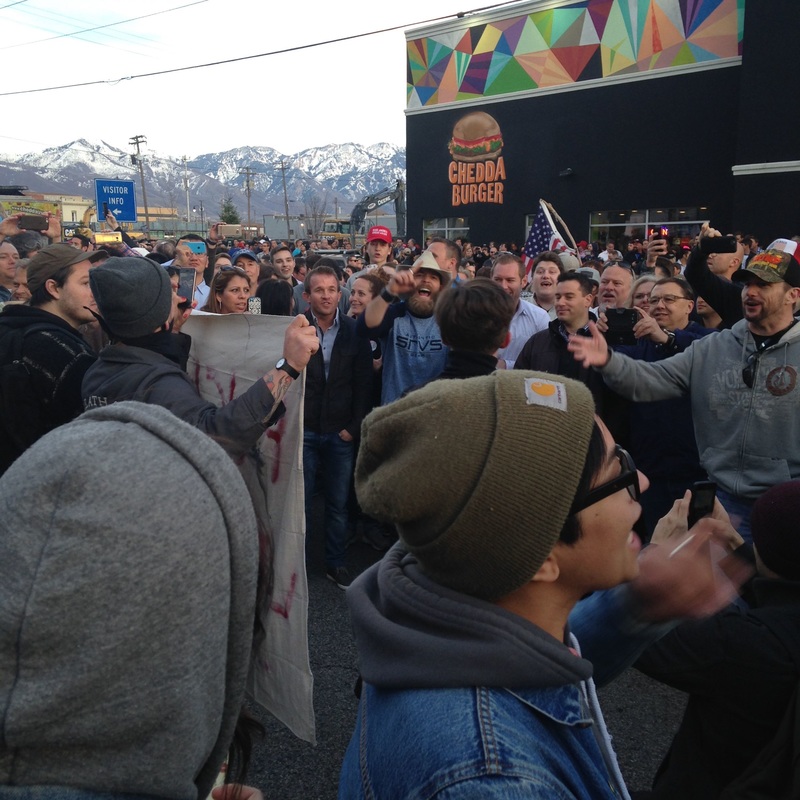| First, let me say I am not a novice when it comes to protests. My Dad took me to hear President Nixon speak in 1970, and we encountered anti-war protesters outside. The first one I remember being sent to as a reporter involved Palestinians outside the United Nations Building in New York in 1982. A couple of years later, as a reporter in Las Vegas, I was sent to cover a prolonged and acrimonious strike by unionized hotel workers. There were nightly clashes between chanting protesters and police in riot gear. In the early ‘90s, I covered the chants of left-wing |
| | groups opposed to President George H.W. Bush’s policies. they marched near where he was staying overnight in Salt Lake City. These are just the memorable highlights. It’s hard to be in this business for 34 years and not experience people exercising their constitutional right to peaceably assemble. In each instance, emotions ran high, and the chants were emphatic. But when I went downtown last Friday to observe protests outside the Donald Trump rally in Salt Lake City, it quickly was apparent that society has taken an ugly turn during my long career. On one side were anti-Trump people chanting a vulgar obscenity that, if used more than once, will guarantee a motion picture an R rating. One the other side, Trump supporters who didn’t make it in the hall where he was speaking, countered with a chant that included a different vulgarity — one that would get you a trip to the principal, back in the day. Neither one constituted an argument. Neither was meant to promote an idea or concept. The protests I covered early in my career contained none of this. It would have been seen as destroying the credibility of the movement and detracting from the message. I wasn’t surprised by what I encountered. Like you, I had watched and read news accounts of what happened at Trump rallies in other cities. But I had hoped to get a better idea why people felt as they did, or to get a handle on a movement that is affecting politics in a profound way this year. hat I didn’t witness any violence. But I got something else, too — a heightened sense of concern for the nation and its ability to solve problems through empathy and reason. Trump deflects responsibility for this. In an editorial board meeting with the Washington Post this week, he said each rally is preceded by an announcement urging people not to engage with protesters. But, of course, he has spoken of violence against these protesters even as he repeatedly uses vulgarities in other contexts. But Trump is at least partially correct when he blames the protesters, as well, for inciting anger and confrontations. From what I saw, neither side Friday night had angels on their side. That included the Bernie Sanders supporter who, fresh from a rally of his own, peppered us with scatological references as he drove by in a pickup truck, holding his Bernie sign aloft. The Trump campaign didn’t bring this onto society by itself, just to the political scene. What I witnessed has become all too common in other settings. It’s common in sports. Fans at the University of Wisconsin, for instance, have been known to chant vulgarities during games. An editorial in the Wisconsin State Journal took issue with this, saying it is neither fun nor funny. But the editorial also said, “The issues involving foul-mouthed college students are not paramount in our time…” I beg to differ. Words matter. Obscenities are meant to hurt without the soothing benefit of any constructive offering. Often, they turn the sacred into a profane weapon. They degrade, belittle and demean, while giving the one hurling them a false sense of superiority. If we accept them as a part of how we select the holder of the seat held by Lincoln, Washington and so many other noble leaders, we cheapen America’s place in the world, as well as its unique vision of itself. Shame on Trump and his supporters, and shame on those people who confronted him here last Friday. |


 RSS Feed
RSS Feed

